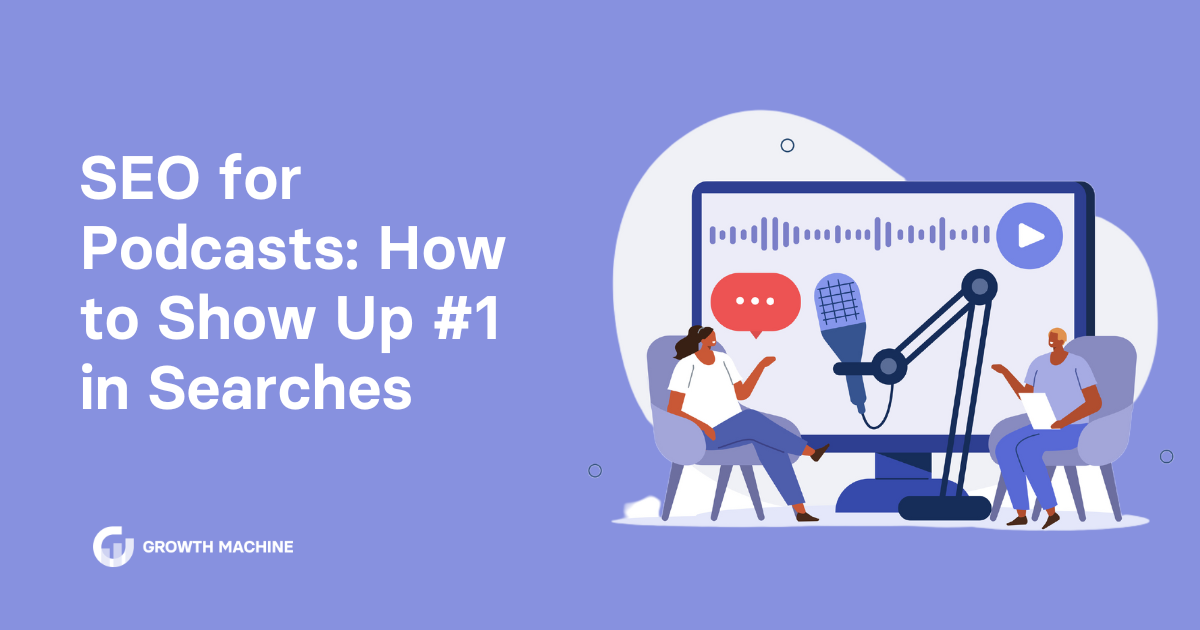SEO for Podcasts: How to Show Up #1 in Searches
Companies like yours are always on the lookout for new ways to make an impact on their customers. For the more auditorily inclined in your audience, you may have launched a podcast to connect. But if you’ve spent any time on Apple Podcasts or Spotify lately, you’ll realize fast you’re far from the first to have this idea. So how can you stand out in this sea of sonic content?
Believe it or not, search engine optimization (SEO) can help you just as much with your audio content as it can with your text-based advertising. Not only that, but you might have an even easier time optimizing your podcasts for primetime than whatever videos you’ve posted on your TikTok, Instagram, or YouTube accounts.
If you want to reach more people with your podcast, you’ll just need to tweak some of the usual SEO strategies to fit this unique medium. Remember: Words are what makes SEO work. That stays the same whether someone’s writing them or speaking them. And luckily, with today’s tools, you can double the impact through transcription and other techniques.
Keep these three SEO tips in mind as you turn your podcast into a search-friendly powerhouse:
- Know your audience.
- Spread your net.
- Use text whenever possible.
Step 1: Know Your Audience
Podcast SEO is just part of your wider digital marketing strategy. The goal with any customer outreach is always to know your audience and target them as best as you can. In this case, you’ll need to balance keyword research, customer desires, and audio content to stick the landing. It’s easier than it sounds!
Balance Generality and Specificity
As with any other type of content marketing, try to toe the line between generality and specificity.
You want each podcast description to hook your niche audience in even more than they were before, but you also want to cast a wide enough net to bring new customers into the fold. Once you know who you’re trying to go after, do some keyword research to see what they’re searching for in the first place.
Define Your Area of Expertise
Present your brand as an expert on a specific field, rather than trying to be all things to all people.
This will help you narrow down the scope of your podcast and SEO keywords. While it’s definitely possible to find niche keywords in a saturated market, you’ll have a much easier time showing up in a Google search with low competition. Figure out what you do well and tailor your podcast SEO strategy around that.
Get Creative With Episode Titles
The title and description of your podcast are the first things people see when they search for your content online. That’s why it’s so important to make sure they accurately reflect what your podcast is about and include relevant keywords.
To optimize each podcast episode title and description, research keywords relevant to your podcast. Try to keep an eye out for what your target audience wants to know. The longer this list is, the better — especially when you’re just getting started.
Once you have a list of keywords, incorporate them into your title and description. Read them out loud to yourself after you do. If they sound clunky, it’s time to go back to the drawing board. SEO should never sound like SEO if you can avoid it.
Step 2: Spread Your Net
After you define your target audience, start to expand your reach. From your episode titles to transcriptions, always look for ways to make them more and more SEO-friendly to the general public as well.
You’ll bring in new listeners by figuring out what they’re looking for. If you provide them with stellar audio content at the end of their search, you’ll also turn them into brand ambassadors. In other words, cast a wide net to increase both your search volume and promote potential word-of-mouth advertising.
Make Use of Multiple Podcast Platforms
Don’t limit yourself to just one podcast directory.
There’s an endless array of podcast platforms to which you can upload your work. Remember: the more places you host your content online, the more those keywords can start doing their magic. Apple Podcasts, Spotify, Stitcher, and Google Podcasts are just some of the options you can consider. You never know which platform your potential audience might use to get their content.
Keep Keywords in Mind
When it comes to defining your search terms, keep an ear to the ground about what your listeners want to learn more about.
As you craft each new episode, try to do so with these keywords in mind. Your content will be easier to find if new potential fans are already searching for content related to it.
Just like in your title, don’t sacrifice originality and flow just to cram in as many SEO phrases as possible. Fit as much as you can in, but always prioritize a natural approach. Organic-sounding SEO is the best way to generate organic traffic.
Help Listeners Help You
After you draw your listeners in through your podcast SEO strategy, encourage them to do a little legwork getting the word out about your podcast.
Offer them an incentive to share your podcast on social media. A call to action can reap major rewards when it comes to increasing conversions, even for something as simple as getting them to subscribe or tell a friend about your podcast.
You can also reach out to fellow podcasters to see if you can both help each other out with SEO. By including backlinks to each other’s web pages, you’ll benefit your own podcast content as well as theirs when it comes to SEO.
Step 3: Use Text Whenever Possible
Podcast listeners may prefer to get their information by ear, but you still need to use plenty of text in your SEO podcast strategy.
The good thing for your customers is they don’t need to read it if they don’t want to. They’ll be none the wiser about how much value the walls of text in your transcriptions, show notes, and episode descriptions helped push your podcast to the top of their Google search pages. In other words, when it comes to SEO podcast strategy, treat all text as potential metadata.
Build a Podcast Website
Create a website for your podcast even if it’s just a simple WordPress page. Even if you go the minimalist route, don’t phone in the user experience. You want people to browse and start clicking internal links too.
Your podcast page is a major opportunity to jam-pack a bunch of keywords into one spot. Not only that, it can also serve as an audio blog of sorts. You can use it to keep track of all your episodes, show notes, and transcriptions. Treat it as the central hub for your SEO strategy.
Utilize high-value keywords in your headers especially. This is yet another reason why including SEO terms in podcast episode titles is a must — these will often serve as website H2s and H3s too. Make sure to link to other areas of your website and other similar sites via anchor text too.
Create the Right Metadata
Your metadata is a calling card for search algorithms across the internet.
Oftentimes, search engines comb through how you describe your podcast description in these sorts of hidden fields before they peruse any of the visible text itself. In order to generate consistently high levels of organic search traffic, you need the text advertising for your podcast to be just as optimized under the hood as it is out in the open.
Include relevant keywords in your metadata in the same way you would anywhere else. For that matter, try to match them up to the ones you’re featuring the most heavily in your titles, descriptions, show notes, and transcriptions too. Each time you use these words in a different way, your podcast ranks a little higher.
Utilize Transcriptions
Podcast transcriptions are your best friend if you’re looking for a way to include as many keywords as possible in your SEO strategy.
If you tailor your keywords appropriately, you may not even need to tell your podcast host to mention them over and over as they speak. They’ll flow out naturally in many cases. After all, the point of SEO keywords is to provide you with a word bank intuitively related to any given subject. You can also have the host record first and repurpose your keyword strategy after the fact.
Write Podcast Show Notes
Include show notes whenever you publish an episode.
Treat these as shorter than a transcription but longer than a description. In addition to summarizing the content, link to other related material you want to highlight. This can prove yet another boon to getting you higher and higher on search engine results pages (SERPs).
Bring In Listeners With Ironclad SEO
Podcasts aren’t necessarily an intuitive match for SEO, but when you dig down, it’s hard to see how any podcast marketing strategy is complete without a bit of search engine optimization.
From the beginning of time to now, words have come in handy for persuading, educating, and inspiring people — whether spoken or written. They just so happen to be useful when it comes to ranking on search engines too!
Ready to meld your podcast strategy with some tailored content marketing? Contact us to talk about how you can supercharge your audio and blog content with search engine optimization.







